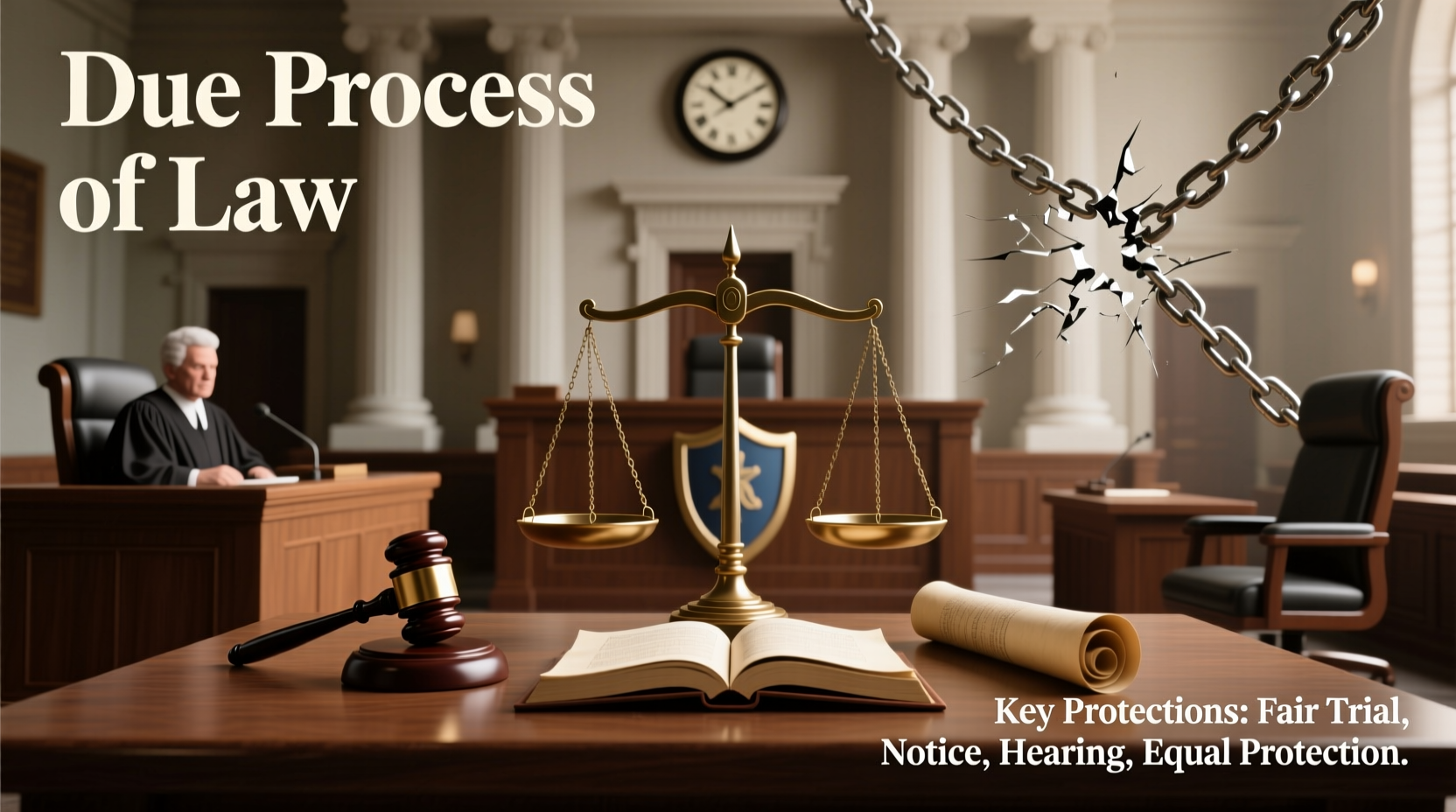Due process of law is a foundational principle in democratic societies, ensuring that individuals are treated fairly by the legal system. It acts as a safeguard against arbitrary government actions, protecting personal liberties and upholding the rule of law. Without due process, justice would be subjective, inconsistent, and vulnerable to abuse. This article explores the significance of due process, its core protections, real-world implications, and practical ways it shapes everyday life.
The Constitutional Foundation of Due Process

Rooted in the Fifth and Fourteenth Amendments to the U.S. Constitution, due process guarantees that no person shall be deprived of life, liberty, or property without fair legal procedures. The Fifth Amendment applies to the federal government, while the Fourteenth extends these protections to state and local authorities. These clauses ensure that laws are applied uniformly and that individuals have access to impartial courts and procedural fairness.
Historically, due process traces back to the Magna Carta of 1215, which established that even the king was subject to the law. Over centuries, this concept evolved into modern legal systems that prioritize transparency, accountability, and individual rights. Today, due process is not just a legal requirement—it's a moral imperative in any society that values justice and equality.
“Due process is not a technicality; it is the very essence of ordered liberty.” — Justice Felix Frankfurter, *Denton v. Pennsylvania*, 1949
Key Protections Afforded by Due Process
Due process encompasses both procedural and substantive elements, each serving distinct but complementary roles in preserving justice.
Procedural Due Process
This refers to the methods and procedures the government must follow before taking action that affects an individual’s rights. Key components include:
- Notice of charges or legal actions
- The right to a fair and public hearing
- Right to legal representation
- Opportunity to present evidence and cross-examine witnesses
- Decision by an impartial tribunal
- Right to appeal
Substantive Due Process
This protects fundamental rights from unjust laws, even if proper procedures are followed. Courts use this doctrine to evaluate whether a law infringes on essential liberties such as privacy, marriage, parenting, and bodily autonomy. For example, landmark rulings on reproductive rights and same-sex marriage were grounded in substantive due process.
Real-World Impact: A Case Study in Due Process Violation
In 2015, a man in Florida was wrongfully imprisoned for over two decades based on faulty eyewitness testimony and withheld exculpatory evidence. Despite maintaining his innocence, he was denied access to DNA testing for years. His appeals were repeatedly dismissed without full hearings, and he lacked adequate legal representation during critical stages of his trial.
Only after a nonprofit legal team took up his case did new DNA analysis prove his innocence. His release highlighted systemic failures in due process—particularly the lack of access to evidence, ineffective counsel, and insufficient appellate review. This case underscores how the absence of due process can lead to irreversible harm, even in a developed legal system.
It also demonstrates why reforms such as mandatory disclosure of evidence (Brady disclosures), improved public defense funding, and independent oversight are essential to upholding justice.
Essential Due Process Protections in Practice
Certain legal rights are universally recognized as core elements of due process. These are not privileges—they are enforceable safeguards designed to prevent injustice.
| Protection | Legal Basis | Practical Application |
|---|---|---|
| Right to Counsel | Gideon v. Wainwright (1963) | Indigent defendants must be provided a lawyer in criminal cases. |
| Protection Against Self-Incrimination | Fifth Amendment | No one can be forced to testify against themselves. |
| Right to a Speedy Trial | Sixth Amendment | Prevents indefinite pretrial detention and ensures timely justice. |
| Presumption of Innocence | Common Law & Constitutional Jurisprudence | Prosecution must prove guilt beyond a reasonable doubt. |
| Protection from Unreasonable Searches | Fourth Amendment | Warrants required unless exceptions apply; evidence obtained illegally may be excluded. |
How to Uphold Due Process: A Practical Checklist
Whether you're a citizen, legal professional, or public official, understanding and supporting due process is a shared responsibility. Use this checklist to ensure fairness in legal matters:
- Verify that all parties receive clear notice of legal actions against them.
- Ensure access to legal representation, especially for low-income individuals.
- Demand transparency in investigations and prosecutions.
- Support policies that require body cameras and recorded interrogations.
- Advocate for judicial independence and adequate funding for public defenders.
- Challenge laws or practices that bypass fair procedures, even for unpopular groups.
- Encourage community education about constitutional rights.
Frequently Asked Questions
Does due process apply to civil cases?
Yes. While most associated with criminal law, due process also applies in civil matters—such as eviction hearings, child custody disputes, and administrative penalties. Individuals must still receive notice and a chance to be heard before losing significant rights or property.
Can due process be suspended in emergencies?
No. Even during national emergencies or public crises, due process cannot be legally suspended. While some procedural timelines may be adjusted, core rights like habeas corpus, fair hearings, and protection from arbitrary detention remain intact. Historical attempts to bypass due process—such as Japanese-American internment during WWII—have been widely condemned as violations of constitutional principles.
What should I do if I believe my due process rights were violated?
Document all relevant details, including dates, officials involved, and any denial of rights (e.g., access to a lawyer or evidence). File a formal complaint with the appropriate oversight body—such as a court clerk, state bar association, or civil rights organization. You may also pursue an appeal or civil lawsuit for damages if constitutional rights were infringed.
Conclusion: Why Due Process Matters for Everyone
Due process is not merely a legal technicality—it is the cornerstone of a just society. It ensures that power is exercised responsibly, that errors are corrected, and that every individual, regardless of status, is entitled to fairness under the law. From preventing wrongful convictions to protecting privacy and dignity, due process defends the very fabric of democracy.
Its importance becomes most evident when it is absent: in cases of coerced confessions, secret trials, or discriminatory enforcement. But when upheld, due process strengthens public trust, promotes accountability, and reinforces the idea that no one is above the law.









 浙公网安备
33010002000092号
浙公网安备
33010002000092号 浙B2-20120091-4
浙B2-20120091-4
Comments
No comments yet. Why don't you start the discussion?